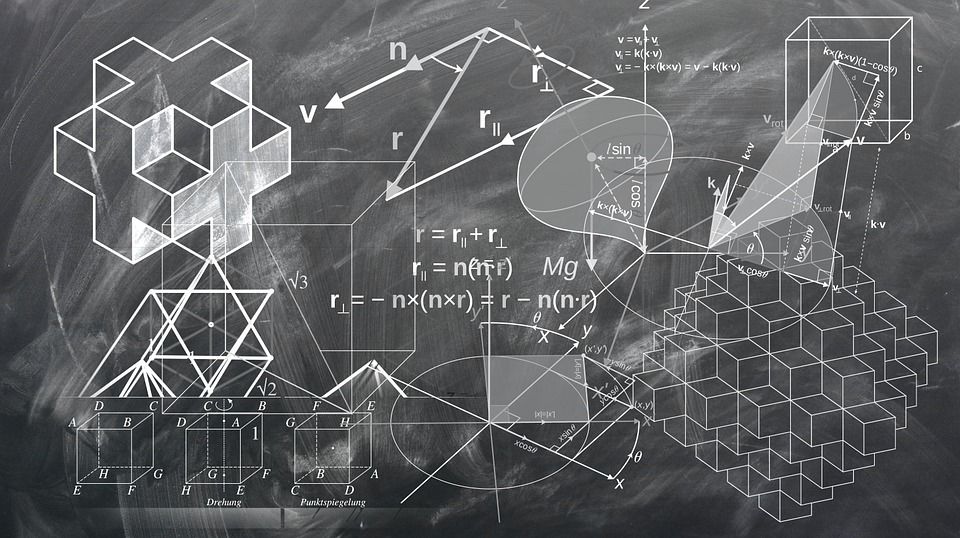The beauty of mathematics
What comes to mind when you think about math? For Nadya, it's the beauty!

Math is an extremely polarizing field. I’ve found that most people either hate math or love the subject endlessly and the reasons for both opinions vary immensely. Since the social norm seems to be hating math, I’ve started thinking more about the contrary- for those who do love math, why do they love it?
I happen to be one of the ‘loves the subject endlessly’ people. My own love for math is difficult to express. I cannot really say what led to my vast appreciation or when it began, but I do know one thing for certain: I find math to be incredibly beautiful. It is elegant, mysterious, challenging, and is without a doubt, my favorite topic to study. I find that many of my mathematically inclined peers would tend to agree. So my question at hand has deviated: rather than pondering why we love math, I want to know what makes math so beautiful?
By looking to various features of math, I’m hoping that an overarching explanation of the mysterious beauty will emerge.
1. Studying math is like studying a language.
When you learn math at any level, you’re taught an abundance of definitions. For example, the word gradient or slope, being the inclination of a line, is something we learn at a young age. As we continue to learn more math, we learn more and more of these definitions and can begin speaking in “math words”.
Later on in your math career, you may start to learn theorems and corollaries. These will be comprised of multiple “math words” in a logical and entwined way which will allow you to speak in “math sentences”. After that, you’ll learn how to build proofs, comprised of the definitions, theorems and corollaries. Your proofs will resemble paragraphs and you’re now able to talk in full “math paragraphs”. You might even go on to write a thesis in which you have many consecutive proofs. You’ll then be able to recite an entire essay in “math language”.
To put the theory to the test, just see what happens when you read your thesis at the dinner table. Unless you’ve grown up with a group of mathematicians, it’s most likely that you’ll be met with a sea of confused and glazed-over-looks. Of course, this is completely understandable. Without knowledge of the definitions and theorems that make up your proofs, it would be nearly impossible to make sense of it all. Thus, I would consider learning math to be like learning a new way to speak, or a new language.
I find this linguistic connection to be not only interesting, but a beautiful way of thinking about math. Math is so often thought of as a terrible subject that we’re forced into learning. When we think of learning math as learning a language, it makes it all the more enticing.
2. Math is visually appealing.
When we think about the pictorial representations of math, I think it’s most common to imagine a boring, linear graph. Although this is an accurate depiction of what we can do with math, there are so many other beautiful ways of visualizing math.
For example, pictured above is what we call the Mandelbrot Set. In layman’s terms, the image represents a set of numbers which all follow a specific set of rules. What’s amazing about this image is when we zoom in for as long as we can, the main pattern of the image will always be a constant. The colors of the image also have a purpose. They represent the various amount of steps required to fulfill the associated equations. We’ve taken an extremely complex, hard to digest situation and made it look incredibly cool - how amazing is that?

Another nice visualization in math is anything relating to geometry. Above are examples of some 3D, geometric shapes that represent various sets of rules in math. Although we are talking about some complex, math ideas, we can represent them artistically and derive beautiful images once again.
There are so many instances in math where we can represent a mundane looking math equation with a beautiful, artistic image that appeals to mathematicians and the general public. This is an easy-to-digest and very clear connection as to why math might be considered beautiful.
3. Math is a balanced subject.

When we do math, we are always maintaining balance. To give you a clearer idea of how that is, think about solving an algebraic equation for a variable. In order to deduce what our variable, say x, is equal to, we perform various operations to both sides of our equation. Remember your year 7 teachers saying “You must do unto this side as you do to that side”? Well, what they were telling you in other words is “maintain the balance”.
This idea of maintaining balance is not often how we perceive solving our math problems. In general, these processes are seen as some of the driest and most tedious calculations that we do. So, next time you solve an equation, think about how you feel when you balance on one leg in a yoga class, or when you spin in a quick circle in dance class and don’t want to topple over. The motions we go through to achieve balance are inherently calming. The same can be said for solving math problems and balancing out the two sides.
If we think about some of the processes of math in this way, it makes math appear much more calming and beautiful than it is generally perceived.
4. Math is challenging in nature.

I think most of the world can agree upon the fact that math is hard. It is notoriously difficult to understand, tedious to carry out various procedures, and it’s almost always impossible to feel confident while interacting with the field in any capacity.
Although many people might be turned off from math because of the challenge aspect, many mathematicians thrive in the subject for this reason. Working day and night in order to master certain math topics can be very exciting for a mathematician. Even better yet is when you find yourself in a group environment where you can encourage each other throughout the tedious learning process. As much fun as the process can be, once you are able to finally crack understanding, it can be utterly euphoric.
As humans we seek gratification from our accomplishments and math is really no different in that regard. As mathematicians, we may face some of the most time consuming and laborious tasks, but upon solving we receive immense and immediate satisfaction. This sense of accomplishment makes math all the more appealing.
5. Math is more complex than what meets the eye.

Similar to being a challenging subject, math can also be much more complex than what we initially perceive. As a student learning math at a young age, we learn the many basic operations that will carry us through the rest of our math careers. We learn how to add, subtract, add fractions, and many other procedures. While we learn and do these various steps, we don’t often stop and think about the derivation or reasons for why these particular things work.
When you continue to study math, you are introduced to the world of proofs. Proofs essentially prove the various accepted facts and ideas of math. So as we learn more, we get to build on our previous knowledge and in turn, learn how and why certain concepts came about thousands of years ago. Essentially, some of the easiest and most basic functions of math have incredibly deep and complex derivations.
This fact about math makes it all the more mysterious and interesting. Knowing that there is always more to know and discover, and that it will continue to evolve, gives math a beautiful sense of mystery and excitement.
6. Math is a descriptor for life.

Someone in your life at one point or another has probably told you that “math is everywhere”. If you were a young student at the time, you probably rolled your eyes and thought ‘whatever, my teacher just wants me to do more of my homework assignments...’. Well, I’m here to tell you that your teacher was right!
Everywhere we look, we can spot some form of mathematics. Whether it be the measurements of buildings around us, the angles of your car park, or the calculation of the total price of your meal out, we are always seeing and doing math.
It’s incredible that such a notorious subject is so prevalent in each one of our daily lives. Whether we like it or not, we will be doing math for the rest of our lives.
I find this last point more fascinating than anything. Math could almost be considered a universal descriptor for everything we know. Math really is everywhere!
In my opinion, math is undeniably beautiful for such an array of reasons: it is its own language, it’s pictorially stunning, it’s balanced, it’s challenging, it’s more complex than we initially think, and it’s a way for us to describe almost everything that we know. Its beauty is not due to one overarching factor; but rather, a conglomerate of so many. Although I might define beauty by these 6 ideas, another person might find beauty in a completely different set. It is entirely up to each individual person’s perception.
If you’re someone who isn’t too keen on math, try to think about some of these reasons next time you do a problem. If you think of learning math as learning a language or remember that there are reasons for the tedious procedures you’re carrying out that haven’t become obvious yet, will that make the process more enjoyable? And if you’re someone who also thinks math is beautiful, what makes the subject stand out to you?
Writing this article has led me to believe that the reasons for math being beautiful are infinite.
